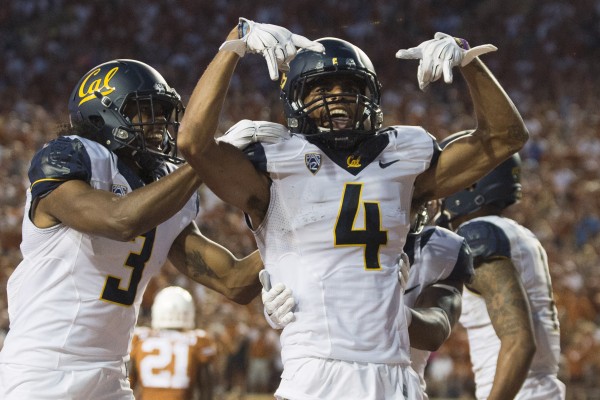To a certain undeniable extent, the Texas Longhorns — as you read this piece — feel crushed.
They fought so long and so hard, mostly uphill, on Saturday night against the California Golden Bears. They trailed, 45-24, in the second half. They gave up 31 straight points after attaining a 24-14 lead late in the first half and owning all the momentum of a freight train. They endured many of the aches and pains which have characterized coach Charlie Strong’s brief tenure at the 40 Acres.
All that work, all that perseverance, had seemingly paid off with overtime or at least the promise thereof. All the Longhorns had to do, with just over a minute left in regulation, was to kick an extra point… and not the 33-yard NFL version from a hashmark, either. 20 yards, straight ahead, no worries.
Right?
*
In the kind of story you just couldn’t make up if you tried, Cal did avenge its snub in the politicized race for the 2005 Rose Bowl with Texas. The Golden Bears did what they set out to do in Austin. However, that it came by way of a missed PAT and a 45-44 score has to tear away at the hearts of the Longhorns. They felt they deserved the overtime, and based purely on resilience, they did.
The unfortunate young man who missed that end-stage PAT? His last name was Rose… just like the bowl game the Longhorns reached at Cal’s expense nearly 11 years ago, keeping Berkeley out of a Granddaddy since 1959.
Nick Rose did lose this game for Texas, and Cal achieved the bottom-line result it so ardently pursued on Saturday. Bevo is heartbroken. Berkeley rejoices.
Yet, it’s so much more complicated than that, especially on the losing side.
*
California walks away with a win, a boatload of relieved players and coaches, and some teachable moments about maintaining aggression and concentration to the very end of a game. Those lessons, if absorbed, should serve the Bears well in a Pac-12 North which enjoyed a great Saturday — both on its own terms, and relative to the Pac-12 South. California is almost certainly headed back to a bowl game this season, but now the Bears’ challenge is a matter of being great, not merely good. The potential to stack up a lot of wins is there. We’ll see how this game teaches the Bears in the weeks ahead.
For Texas, the bottom-line reality of losing will sting, especially due to the manner in which the Longhorns fell short. However, when one considers the chaos and dysfunction surrounding not just the football program, but the entire Texas athletic department, this past week, it can credibly be said that the Longhorns took a few big steps forward on Saturday, despite the “L” in the standings.
Charlie Strong’s switch from Shawn Watson to Jay Norvell as lead play-caller? It paid off.
Strong’s switch at quarterback from Tyrone Swooped to Jarrod Heard? It paid off.
A lot of switching has occurred at Texas, switching which began with the dismissal of athletic director Steve Patterson earlier in the week. Uncertainty was swirling around the university, the football program, the locker room, everything about University of Texas athletics. Everyone in Austin certainly wanted a victory on Saturday night, but this was the next best thing.
The coach, the offensive play-caller, the quarterback — all doubted, all questioned, all needing to prove a lot — gave the fan base a lot of confidence that the big battleship known as Texas Football can be made whole again. Some losses are signs that a program lies beyond a point of hope or redemption, but it’s just the opposite for Texas on a night when the scoreboard really didn’t tell the story of how a program’s outlook changed — it changed for the better.
Cal won a game. Texas won a lot of encouragement. You saw the thrill of victory and the agony of defeat, but underneath the vivid portraits of college athletes either celebrating or cursing a missed PAT, both programs gained a lot from week three of the college football season.
